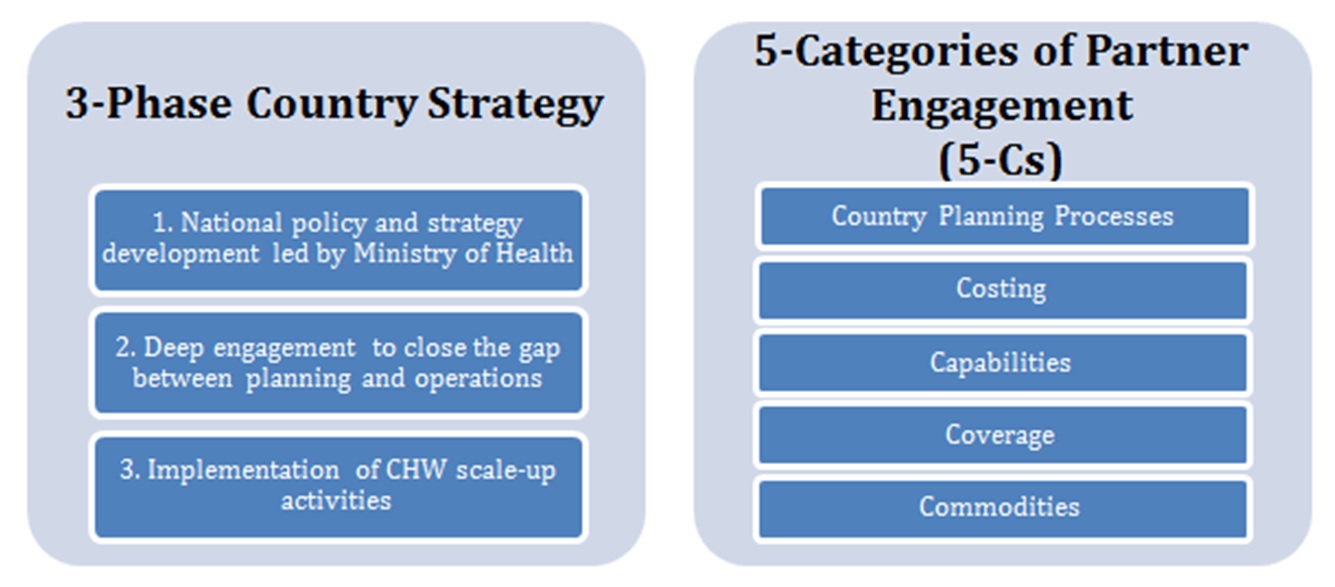It’s a Campaign Celebration!

Half a year ago, the One Million Community Health Workers (1mCHW) Campaign began an initiative to coordinate, expand, and accelerate community health worker (CHW) programs in Sub-Saharan Africa, in order to meet the health related Millennium Development Goals (MDGs). It is a special honor to mark the first six months of the 1mCHW Campaign’s existence. There is much to celebrate.
Six months out, we are excited to report that 1mCHW has developed an operating strategy and partnership framework to propel its progress through the coming months. A crucial element of the Campaign is to provide clear opportunities for action for public and private sector partners to support African Governments in establishing, upgrading, and expanding CHW programs on a country-by-country basis. To facilitate this collaboration, 1mCHW has articulated a 3-Phase Country Strategy with each phase divided into 5 Components (5-Cs) that highlight the most essential considerations for CHW scale-up. This matrix approach allows common and country-specific partners to actively engage in the category of CHW scale-up that is most aligned with their resources and objectives. By harmonizing and integrating the efforts of diverse institutions in SSA with Ministry of Health-driven processes, 1mCHW is providing a strong platform for scale-up, with an eye on the 2015 MDG deadline.
The 1mCHW Campaign methodology is already taking off in eight pilot countries, four of which are moving remarkably swiftly through the first stages of scale-up planning. The process accelerated in mid-April, when a national CHW planning workshop marked commitment by the 8 pilot countries –Comoros, Ghana, Liberia, Malawi, Nigeria, Senegal, Tanzania, and Zanzibar – to engage in CHW scale-up discussions. Moving forward, the Campaign is currently making an open call to all low-income countries in SSA to join the Campaign, and receive technical and financial support for CHW scale-up. In several of these target countries, the initial steps of partner engagement and in-country contact identification is already in progress.
We are tracking progress of the entire Campaign via an information hub (the “Operations Room”), which will be publicly launched in September 2013 (advance views can be made by request) as an online platform, serving as a real-time dashboard of CHW activities in Africa. It will systematically document the number and quality of CHWs at district-level, as well as serve as a hub for activating linkages between global and local participating organizations.
The 1mCHW Campaign is also marshaling resources to improve and standardize levels of care. For example, we are a core partner of the BackpackPlus initiative—developed by the MDG Health Alliance, UNICEF, and Save the Children—which is designing a physical prototype kit for CHWs, together with tools for enhancing CHW supply chain management.
The 1mCHW Campaign, though still in its early stages, can already point to important achievements: a concrete scale-up strategy, a growing network of partners, principles for improving the performance of CHW programs, and emerging success stories from several of the pilot countries. Moreover, the program has laid the foundation for its future expansion. In the past months, the success and feasibility of CHW scale-up have been featured in The Lancet and The Bulletin of the World Health Organization—1mCHW is turning this literature into a promising and hopeful reality. These first months have been a most productive and promising step towards the shared target of a coordinated system of CHWs that reach and serve Africa’s most vulnerable populations.
To show your support for the 1mCHW Campaign on the occasion of its 6-month birthday, tweet about us @1MHealthWorkers or Like us on Facebook!


Comments are closed